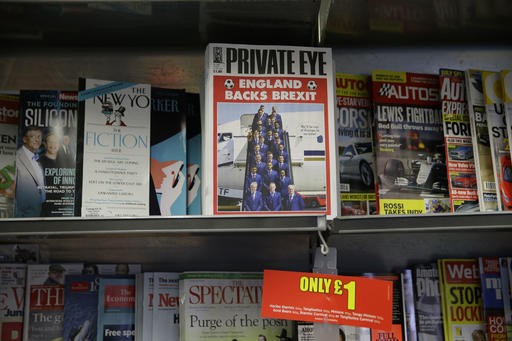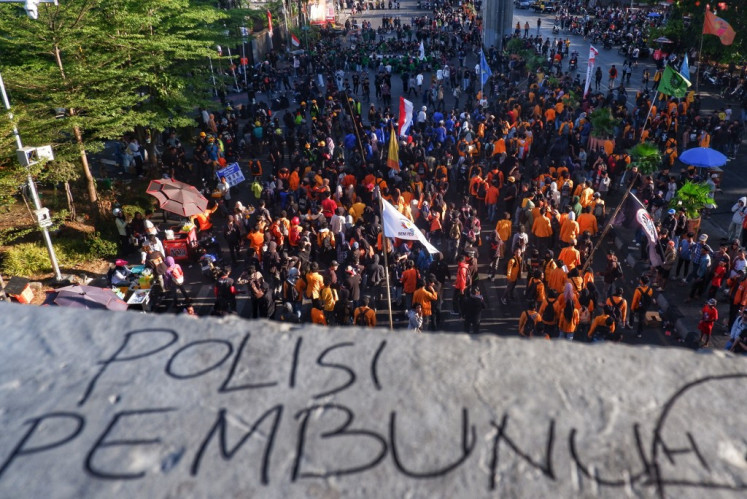Popular Reads
Top Results
Can't find what you're looking for?
View all search resultsPopular Reads
Top Results
Can't find what you're looking for?
View all search resultsBrexit and external risk for Indonesia's economy
A Brexit would not directly affect the Indonesian economy, but the global uncertainty it would create would sooner or later exacerbate external risk facing Indonesia. The first thing to look at when assessing the impact Brexit might have on the Indonesian economy is exports to the UK, from which we can conclude that the impact is limited. This is correct as far as exports are concerned. Last year our exports to the UK amounted to $1.5 billion, only 1 percent of our total exports of $150 billion.
Change text size
Gift Premium Articles
to Anyone
B
rexit, or Britain’s exit from the European Union, might be a distant affair for many Indonesians. But it may be hard to remain oblivious to it because its impact could reverberate into the Indonesian economy.
In a referendum held on Friday last week, the people of the United Kingdom voted for Britain to leave the EU, after more than 40 years of being part of this giant political and economic bloc.
The result of the UK referendum is unprecedented, because no country has ever left the now 28-nation EU. The vote could have enormous economic consequences, not only in Europe but also further afield.
With an exit from the EU, the UK’s economy would be in turmoil, and many have even predicted that it could head into recession.
Many large corporations use the UK as their base for managing their business in Europe, and with a Brexit, many would relocate their offices and factories in the UK to other EU areas.
The UK’s trade and investment would also receive different treatment to what the EU receives. Unemployment would rise and economic activity would slow down.
Already, stocks around the world have plunged, and the British pound has plummeted to close to US$1.33, its lowest level in more than 30 years.
As the global capital market slips into more volatility, capital and investment flows would be disrupted, weakening global growth further.
And as investors and businesses are pondering the economic consequences of the Brexit, it is likely they will hold out on investment decisions.
A Brexit would not directly affect the Indonesian economy, but the global uncertainty it would create would sooner or later exacerbate external risk facing Indonesia.
The first thing to look at when assessing the impact Brexit might have on the Indonesian economy is exports to the UK, from which we can conclude that the impact is limited. This is correct as far as exports are concerned. Last year our exports to the UK amounted to $1.5 billion, only 1 percent of our total exports of $150 billion.
Our total trade with the UK only amounted to $2.3 billion. Compare this with our $31 billion in trade with Japan, or $24 billion with the US.
But what is worrying about Brexit is its impact on Indonesia’s trading partners. The UK’s economy is the fifth largest in the world, and it is the largest trading partner of the EU.
Its trade with the US and Japan, and even China, is also significant. With its investment flow and trade disrupted by Brexit, and with its unemployment rising, the UK economy could slip into recession.
The EU economy, already suffering from anemic growth, high unemployment, high levels of debt and mass immigration from the Middle East and Africa, would be hurt further by the Brexit.
Indonesian non-oil exports to the EU up to May this year were worth $5.8 billion, or 11 percent of our total non-oil exports, the second-largest destination after the US. If the EU’s economy stalls after Brexit, our exports to the EU, which are mostly commodities, would also be affected.
The further weakening of global growth would make the prospect of commodity prices recovering more distant.
The oil price fell 5 percent on the day of the Brexit vote, and this could be a sign of what would happen to the price of other commodities.
This would put further pressure on Indonesian exports, which still very much depend on commodities.
The impact of Brexit will reverberate through Indonesia’s capital market.
The Jakarta Composite Index (JCI) slipped by 0.82 percent, a modest decline compared with its peers in the region.
The shares of the big banks were badly hit, as happened in other countries, as the risk of declining global liquidity mounts.
But with volatility continuing in the global market, it would be hard for the JCI to resist the downward pressure.
A sell-off on the same scale as in 2015 could not be ruled out, as investors try to avoid risk, and capital flees to safe-haven countries.
The moderating influence on this negative trend perhaps would come from the attractiveness of Indonesian sovereign bonds, because their yield is higher compared with bond yields in other countries.
At this point it is not clear whether the economic impact of Brexit would just be a normal crisis, or would rival the closure of Lehman Brothers in 2008 that plunged the world economy into the worst recession in history.
Whatever the outcome it is important for Bank Indonesia (BI), the central bank, to continue in its accommodative mode in terms of monetary policies.
It is important for the Financial System Stability Committee (KKSK) to be given more clear functions and responsibilities, so that it can supervise the banking system more effectively, should another banking crisis arise from the Brexit.
And as the House is finalizing its deliberation on the revised 2016 state budget, it is important for them to note the impact of the market turmoil caused by the Brexit on the Indonesian economy.
This is to make sure that the assumptions used in the budget regarding GDP growth, exchange rates and oil prices are not out of line with the new realities.
The market turmoil from Brexit has thrown the global economy into uncertainty, as investors around the world assess its impact.
British Prime Minister David Cameron has resigned, and it will take three months to find his successor before which Britain cannot formally negotiate its exit with the EU.
Then it would take two years until Brexit was formally finalized. Until the outcome of negotiations is clear, it will be difficult for investors to make decisions.
We know that uncertainty is the biggest enemy of investment and growth.
The government has to assess how much this situation will affect investment in Indonesia. President Joko ”Jokowi” Widodo’s administration has gone a long way in issuing its economic packages and deregulation measures, and in building infrastructure, but it has yet to attract investors.
Now with the market turmoil from the Brexit, the task of attracting investors will be more daunting.
***
The writer is a commissioner at a publicly listed oil and gas service company. The views expressed are his own.
---------------
We are looking for information, opinions, and in-depth analysis from experts or scholars in a variety of fields. We choose articles based on facts or opinions about general news, as well as quality analysis and commentary about Indonesia or international events. Send your piece to community@jakpost.com.










